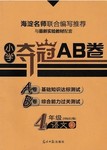题目内容
They decided after dinner.
A. have a broke B. have a break
C. to have a broke D. to have a break
练习册系列答案
 小学夺冠AB卷系列答案
小学夺冠AB卷系列答案
相关题目
题目内容
They decided after dinner.
A. have a broke B. have a break
C. to have a broke D. to have a break
 小学夺冠AB卷系列答案
小学夺冠AB卷系列答案